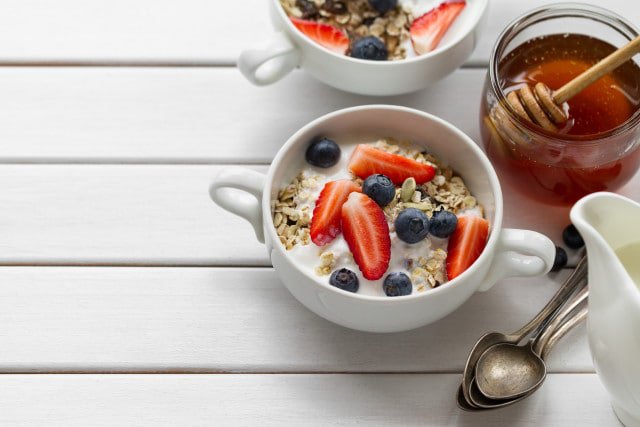A Good Start: Pre-Race Breakfasts
Pre-marathon fuelling doesn’t end with pasta. Here’s what you should have for breakfast on race day.
Pre-marathon fuelling doesn’t end with pasta. Here’s what you should have for breakfast on race day.

If you’re like most runners, you spend the final days before your marathon feasting on high-carbohydrate foods. But a good nutrition plan doesn’t end with that last plate of pasta the night before your race. Your pre-race breakfast is just as important, as it helps restock the liver glycogen (or stored energy) that got depleted overnight. ‘Liver glycogen keeps your blood-sugar level steady during exercise,’ says Jackie Berning, sports nutrition and metabolism professor at the University of Colorado, US. Your morning meal provides fuel for your brain, helping to sustain motivation and concentration during a long race. But just how much should you eat on race morning to optimise your performance? Probably more than you think. Here’s how to choose the ideal amount and combination of foods and fluids to power you through to a strong finish. Practise with different options before a warm-up race so that by the time race day comes around, you’ll have confidence in your fuel plan.
Your morning menu
The best pre-race breakfast consists mainly of carbohydrates, since they’re digested most rapidly and are your body’s preferred fuel source, says Penny Wilson, a registered dietitian who works with endurance athletes. Small amounts of protein will help stave off hunger during the later kilometres. Limit or avoid fat and fibre; the former takes too long to digest, while the latter can cause bloating and gastro-intestinal (GI) problems. ‘I recommend foods like a bagel and peanut butter, porridge with milk and dried fruit, or yoghurt and toast,’ says Wilson. Other good options include a banana and high-carb energy bar, a waffle with syrup and strawberries, or even a bowl of rice.
For runners who tend to feel queasy on race morning, sticking with liquid carbs can help prevent GI problems while still providing energy and hydration. Smoothies, juices and sports drinks all pack quickly digesting carbohydrates that empty easily from your stomach, says Wilson.
A big breakfast?
While your usual bagel and banana might power you through a morning of meetings, it’s not enough to fuel you through a marathon. Research shows that consuming 1.5-1.8g of carbohydrate per half a kilogram of body weight is ideal for improving performance, says Berning. For a 63kg runner, that translates to 225-270g of carbohydrate – or about 1,000kcal, which may sound like a lot just before a hard effort. The key is to get that meal in early – three to four hours pre-race to be exact, according to the American College of Sports Medicine. That gives you enough time to digest so your stomach will be fairly empty and your muscles and liver totally fuelled.
If you’re not sure you can stomach 1,000kcal at once, you can divide them up into two smaller meals, says Berning. In that case, eat 200-400kcal four hours before the start, along with 350-600ml of water or sports drink (giving you plenty of time to hit the portable toilet). Between 90 minutes and two hours before the start, eat most of the remaining carbs – again, choosing easy-to-digest options.Because many races start at 9am or earlier, you’ll have to set your alarm for a very early wake-up to hit that four-hour window. If that’s not realistic, you may choose to eat your entire pre-race meal just two hours before the start. But because you’ll have less time to digest, eat only one gram of carbohydrate per pound of body weight (150g, or 600kcal, for a 63kg runner) – and stick with foods and liquids you know are easy on your stomach. As you’re consuming less, you do risk running out of liver glycogen, which will cause your blood sugar to drop and may mean you hit the wall. So be vigilant about fuelling early in the race (consuming 30-60g of carbs per hour) to keep your energy levels high.
Have your last 20-30g of carbs 30-60 minutes prior to the start. This could be a gel or 500ml of sports drink. ‘This provides the last shot of fuel to hold you over until you get into the rhythm of fuelling mid-race,’ says Berning. Berning also stresses that every runner has different food and fluid tolerances, which means a plan that works for one runner might spell GI disaster for another. That’s why it’s key that you practise your pre-race meal strategy during training. ‘The stomach and gut need to be trained to handle food before a long run,’ says Berning. She suggests trying various different combinations to find the one that works best for you. And, once you find it, stick with it. ‘Eat the exact same meal on race morning that you practised with in training,’ says Wilson, ‘and you’ll be set.’

